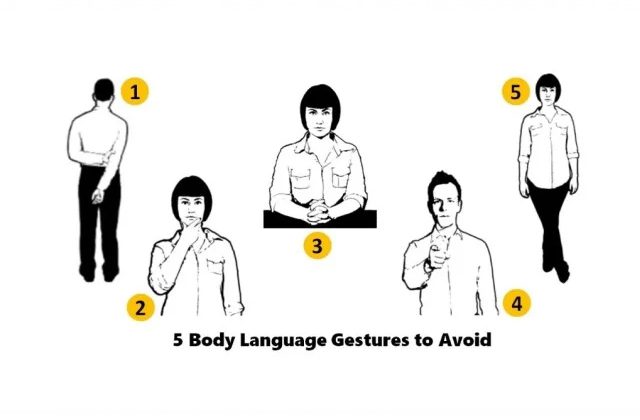Your body can help you highlight and make your points more clearly in public speaking. The most effective way for us to show our confidence, attitude, and the message we want to get across is through body language. Scientific research has shown that a person’s personality is determined by body language.
Therefore, those who can relate to and understand how body language and gestures influence one’s personality realize that improving your body language is necessary to have an influential personality. The keys to a dynamic personality for generating an excellent first impression on an audience are proper speaking posture, gestures, body movement, facial expression, and eye contact. This article on personality tips lists five body language gestures that provide the wrong impression.
Top 5 Body Language Gestures That Leave Bad Impression
- Crossing Arms Behind Your Back
Talking to someone while crossing your arms behind your back may give them the wrong idea non-verbally. You can come off as trying to break off the conversation or as confident and in charge. This could also imply that you don’t believe what the other person is telling you. If you tightly clasp your hands and grasp both of your arms, one would assume that you’re trying to hide anything when you’re being questioned during a talk.
Yes, holding your arms behind your back while tightly holding the hands of another person and slumping your shoulders is a sign of anger, uneasiness, and lack of confidence. This suggests that you lack confidence in yourself and are perhaps seeking comfort.
- Touching Your Face
If you touch your face while speaking to someone, you can unintentionally give them a negative impression. During a talk or interview, touching your face is a weak gesture. You display worry, anxiety, lack of self-control, and confidence symptoms. This implies that you continually think about something and demonstrates a lack of attention to the conversation.
Remember that stroking someone else’s face typically denotes intimacy and affection, whereas hiding your genuine emotions by touching your face. It could also signify that you must prepare or be more knowledgeable about the circumstance.
- Hand Clasping or Crossing Finger
When you chat with someone and clasp your hands or fingers, you can unintentionally give them a negative impression. So yes, even though many individuals would believe that having their hands clasped or fingers intertwined offers a powerful and authoritative impression, the exact opposite is true.
Classing your hands or crossing your fingers during a conversation shows nervousness, insecurity, trepidation, and anxiety. When presenting or speaking, if your hands keep clasping or wringing, it may indicate that you need more planning. Additionally, it is a sign of tension, stress, and irritation. The tighter your hands or fingers are clasped, the more stressed and unprepared you appear to be or hiding.
- Pointing the finger at Someone/ Something
When you talk to someone while pointing your finger at them, you can unknowingly give them a negative impression. Many people may use finger-pointing to make a point or draw attention to something. However, because it appears unpleasant and aggressive, it is NOT a good gesture. The other person may feel offended if you point your finger at them. Pointing the finger at anything is also seen as impolite in educated societies. With your index finger extended, you are indicating aggression.
- Crossing Legs While Standing
When you cross your legs speaking to someone, you can send the wrong message non-verbally. You might need to be sure of yourself and what you have to say. A better posture could result from crossing one leg over the other. Doing so, you lose your self-assurance, and your words lose their impact. Crossing your legs when speaking can give the impression that you are reserved, afraid, or stressed.








